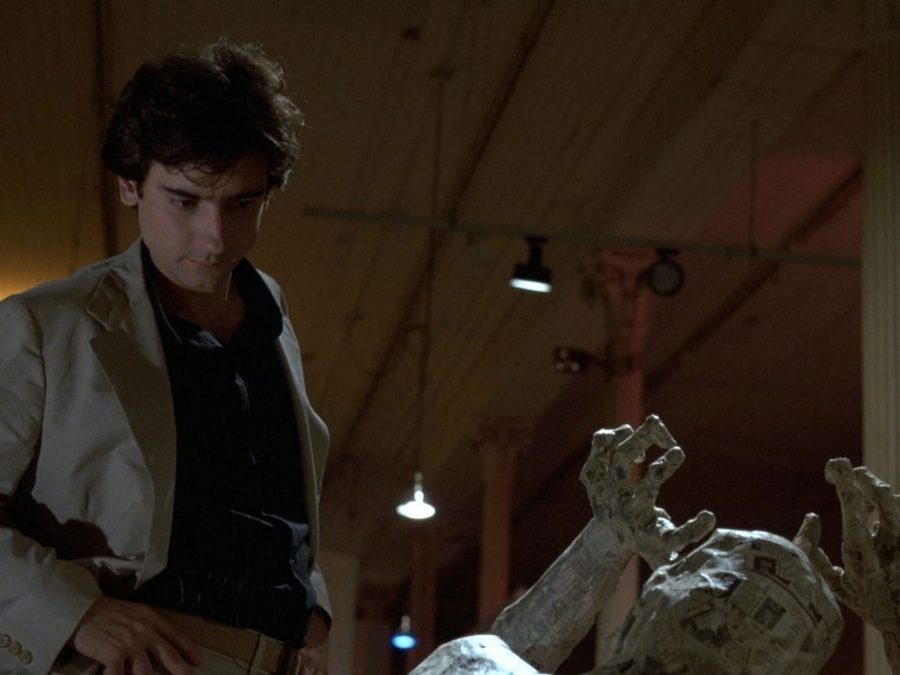Before 1985, Griffin Dunne was probably best known for being the sidekick first-victim-turned-reanimated-wisecracking-corpse of horror-comedy An American Werewolf in London. Searching for decent roles led him and producing partner Amy Robinson to develop their own films, including a script they offered to director Martin Scorsese (Robinson had starred in his 1973 breakthrough Mean Streets), himself then struggling to get projects made.
After Hours, a breakneck, blackly comic, nocturnal nightmare of Manhattan yuppie Paul Hackett adrift in a strange, sinister Soho, wasn’t a hit. Nevertheless, the film reinvigorated Scorsese’s filmmaking passion, gave Dunne his biggest role and has been reassessed as an influential gem. Nearly 40 years on, to celebrate its 4K restoration and re-release, Dunne, who went on to direct Hollywood hits like Practical Magic, recalls his career highlight.
LWLies: Is it true that, when your partner Amy Robinson found Joe Minion’s script at the Sundance Lab and sent it to you, you read it standing up, turning the pages with your toe because it made you so anxious?
Griffin Dunne: I did. I would get to where something terrible happened and be like, ‘Oh my God…’, and walk away from it. And then approach it again and [mimes peering down] just keep going… Amy FedExed it to me with just a note, ‘This part is you!’ And she was right. It’s one of those rare times you just see yourself so completely in the role.
When you approached Martin Scorsese to direct, he was in a slump after The King of Comedy’s commercial failure and The Last Temptation of Christ’s cancellation. Was he an obvious choice? Even if you love Taxi Driver or Raging Bull, After Hours is a very different tone.
It was an out-of-the-box idea, in that there was nothing previous [that compared]. I mean, King of Comedy, which is another movie that people were slow to appreciate, I found hilarious but, yeah, very different in tone. But Amy knew Marty quite well, and his sensibility of finding humour in disaster. You know, he had his own After Hours experience – when Last Temptation of Christ was falling through, that was his Paul Hackett moment! He saw the humour in it.
You also had a prior, unusual working encounter with Marty, right? Did he recall that at all?
He did, because it was so ridiculous. He had an agent, Kitty Hawks, who was Howard Hawks’ daughter. She was a friend of my parents, and she told me, ‘There’s a wonderful part in a movie called Alice Doesn’t Live Here Anymore, you should go meet the director.’ So, I go over to Warner’s, knock on Marty’s trailer door, and he goes, ‘Can I help you?’, looking to see if I’m delivering a sandwich or something. And I said, ‘Yeah, I’m here to meet you for your movie.’, He’s like, ‘Alice Doesn’t Live Here Anymore? The kid [part] is 12 years old! Why would Kitty send you?’
How old were you at the time?
I was 18, 19 years old! [laughing] But it left a huge impression on me that instead of sending me off, he invited me in and we just talked for half an hour. We laughed a lot.

While filming, Marty wanted you on edge for Paul’s anxiety to show and even imposed a sex ban on you! Did it work?
He did catch me being a little too relaxed with massaging the sexiest woman on earth, Linda Fiorentino. We’d shot the day before, and I was appropriately breathless with desire. But then the weekend happened. And I slipped and had a… fucking accident… and suddenly [we’re shooting again], I’m massaging her like Pepe LePew. Marty goes, ‘Cut, cut, cut! You got laid!’ And I’m like, ‘I know, I’m sorry…’ And Marty’s like, ‘You ruined the whole fucking movie! We should just go home.’ The fear kicked in so high and it turns out that fear and loss look just the same.
You’ve gone on to direct successful movies, but during the shoot, were you able to really observe and learn from Marty at work?
Every day I was learning something. He would shotlist and the shotlist – I’ve never seen this since –was on the call sheet, so everybody knew what they were doing. And his energy and enthusiasm was infectious. I’m a very excitable person and behind the monitor, I kind of live through the dialogue. And I felt free to do that because I saw Marty do that. It just looked so much fun.
The film’s ending feels perfect, but it wasn’t the original choice.
It used to end with me still in the [papier-mâché] cast in the car Cheech and Chong drove away, but pretty much all the [test audience] cards said, ‘What happened to him?’ There was no release.
Marty showed it to his colleagues, Brian De Palma and Steven Spielberg and various people, so we had ideas thrashing around, and we came up with one we all just loved: where I climb inside Verna Bloom’s character, and then she gives birth to me on the West Side Highway, and I roll out covered in placenta, naked. And we just think, ‘Oh, that’s brilliant.’
I called up David Geffen, who financed the film, he’d been very anxious to know, and I tell him… He takes a beat, and goes, ‘Have you lost your fucking minds?’ And, uh, I guess we had.
So how did you land on what we now see?
We have Michael Powell to thank for that. Michael was married to [editor] Thelma [Schoonmaker] and he would come and visit [the set], no matter how late, this elderly man in a butterscotch plaid suit and bright red tie. I don’t know that he ever knew my name, he just called me ‘Boy’. But it was so delightful. And he just thought of the most simple, elegant, satisfying ending that was right in front of us all, you know, the circularity. Back at work, it’s perfect.
After Hours didn’t do great business on its release, but it’s had this impressive after life. Would you say it was actually ahead of its time?
Yeah. I went through this earlier with American Werewolf in London, where people didn’t like humour and horror in the same genre. There weren’t any anxiety-driven comedies then, so people weren’t sure what to make of it. But it’s been appreciated over the years; “after hours” has become an adjective for a bad date or a movie where everything goes south. A couple of months ago I saw the restoration for the first time with a live audience and people went crazy. It plays great with a [full] house.
It’s also an amazing snapshot of a particular time in New York, and of your own life. How do you look back at that whole experience?
Soho then was uncharted territory for people who lived above 14th Street. We knew it, but no one else did. Behind the windows of those lofts were [Jean-Marc] Basquiat and [Keith] Haring and all these artists doing the work of their lives, there were all these underground clubs… Being that age, having that endless energy and being in New York, which was then an all-night town, the movie feels to me the way I felt then. It was an incredibly exciting time.
You also helped reenergize Martin Scorsese…
He’s often said that this movie put him back in touch with the urgency and passion he had when he became a director and made Mean Streets and Taxi Driver. It got him back on the path he was originally set up to be on.
After Hours’ 4K Restoration is re-released on March 22nd.
The post Griffin Dunne: ‘Scorsese’s energy and enthusiasm was infectious’ appeared first on Little White Lies.
from Little White Lies https://ift.tt/HQdF0uA



0 Comments